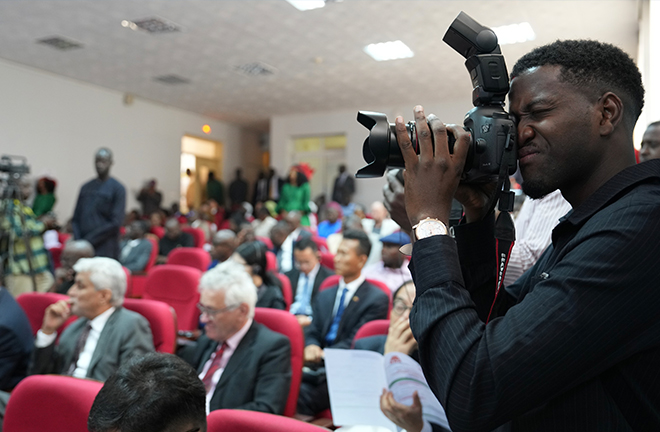Forum calls for greater global solidarity

An African journalist takes pictures at the First West Africa Forum on April 23. Photo: Wang Zhou/CSST
On April 23, scholars and experts gathered in Dakar, the capital of Senegal, for the First West Africa Forum. With the theme “China and West Africa: Working Together to Promote Modernization,” the event featured two parallel sessions: “China and West Africa: Working Together to Promote Modernization” and “Three Global Initiatives and the Development of West Africa.”
Uniqueness of Chinese modernization
China has forged a unique path to modernization, shaped by its national conditions and informed by broader trends in global development. Akanbi Mudasiru Ilupeju, a professor and dean of the Faculty of Arts at the University of Lagos in Nigeria, described China’s achievements as extraordinary. “The scale and speed at which it has transformed its economy and society over the past few decades are unprecedented. From lifting millions out of poverty to becoming a major global economic power and technological innovator, the achievements are undeniable.”
“Chinese modernization is unique and it’s a sporadic evolvement of the efforts of the Chinese leaders in modern times,” remarked Adetoro Olaniyi Banwo, deputy dean of the Confucius Institute at the University of Lagos. “It builds on thoughts, ideas, dreams and action plans that serve to improve the life of the people. The gradual plan shows how the leadership should be creative in planning by taking into account the forces of society.”
Speaking at the forum, Elisée Héribert-Label Adjovi, president of the Panafrican Caucus of Journalists and govenor of the Benin-based Le Label Diplomatique magazine, suggested that understanding Chinese modernization requires recognizing several core elements: China has always independently chosen its development path; it has consistently used opening up to drive reform; it has worked to build a professional public administration body during its period of rapid growth; it has resisted Western-led “shock therapy;” it stresses the importance of a market economy supported by diverse types of enterprises; and it aims to assist other countries in accelerating their own development.
The commitment to helping other countries is rooted in a spirit of partnership, specifically, win-win cooperation, Adjovi explained. It reflects a worldview shaped by China’s long-standing civilization and the Confucian ideal that “for a man to enrich himself, he must first consider how his affairs can make those around him happy and prosperous.” In other words, without a sense of community, individual success is unattainable.
He emphasized that Chinese modernization seeks a balance between the individual and society, between humanity and nature, and between national development and global engagement. He added that China-Africa cooperation vividly illustrates China’s commitment to helping other countries enhance their own standing in the international system.
Deepening China-Africa friendship
“The progress made by China in terms of economic and social development should be a source of inspiration for Senegal and Africa,” stated Olivier Sagna, a retired professor from the Cheikh Anta Diop Dakar University in Senegal. Indeed, China has, over the past decades, provided solutions to many of the problems that Senegal and other African countries still face, whether in agriculture, industrial development, or advances in education, research, and innovation.
Banwo concurred with Sagna’s sentiment, stating “China is truly a friend, brother, and ally of Africa that offers partnership, brotherhood, and engagements with a common vision.”
April 24, 2025, marks the 70th anniversary of the Bandung Conference, which saw the adoption of the Five Principles of Peaceful Coexistence. Adjovi noted that since becoming the world’s second-largest economy, China has not turned away from other developing nations—especially in Africa. Since 2000, through platforms like the Forum on China-Africa Cooperation, the ninth summit of which was held in Beijing in September 2024, China has continued to deepen its ties with the continent.
Significance of Three Global Initiatives
In a world where unilateralism appears to be gaining ground, Sagna underscored the importance of reaffirming international relations based on mutual respect, where the voices of all countries are heard. In this context, the Global Development Initiative (GDI), Global Security Initiative (GSI), and Global Civilization Initiative (GCI), all proposed by President Xi Jinping, offer pathways toward that goal. He emphasized that major global challenges—including climate change, ecological transition, and digital transformation—must be addressed through coordinated international efforts, given their far-reaching implications.
Speaking to CSST, Ilupeju said that in today’s multipolar world, collective wisdom and joint decision-making are essential to solving the complex challenges confronting humanity. From an African standpoint, China’s Three Global Initiatives—the GDI, GSI, and GCI—offer promising frameworks for improving global governance and advancing lasting peace and development.
Banwo echoed this view, saying that the Three Global Initiatives call for a united world in which all cultures and civilizations are understood and respected. This mutual understanding and respect, he said, can guide discussions on national development policies and processes, enabling each country to pursue a path suited to its own context while working collectively to build a shared future.
Citing the GSI as an example, Banwo highlighted its emphasis on support, dialogue, respect, and sincere assistance among nations. “China is the forebearer of a new world, a world where the people’s needs are met, respected, and achieved. It erases all forms of superiority but advocates a situation in which both parties gain simultaneously. This is exactly what the world needs today.”
Sagna added that the GCI is especially relevant in an era when the world has truly become a global village. In such a world, he argued, the goal is not to impose one particular model or vision on others, but to foster dialogue among civilizations—ensuring that every voice is heard. Universal values, he said, can only be truly universal when they are embraced by all, rather than imposed on others.
The forum was co-organized by the China-Africa Institute at the Chinese Academy of Social Sciences and the National School of Administration in Senegal.
Edited by CHEN MIRONG
